
John Marwood Cleese is an English actor, comedian, screenwriter, and producer. Emerging from the Cambridge Footlights in the 1960s, he first achieved success at the Edinburgh Festival Fringe and as a scriptwriter and performer on The Frost Report. In the late 1960s, he co-founded Monty Python, the comedy troupe responsible for the sketch show Monty Python's Flying Circus. Along with his Python co-stars Terry Gilliam, Eric Idle, Terry Jones, Michael Palin and Graham Chapman, Cleese starred in Monty Python films, which include Monty Python and the Holy Grail (1975), Life of Brian (1979) and The Meaning of Life (1983).
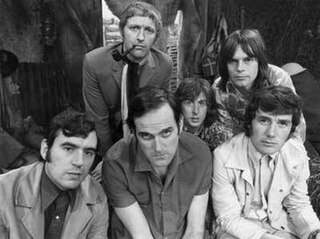
Monty Python were a British comedy troupe formed in 1969 consisting of Graham Chapman, John Cleese, Terry Gilliam, Eric Idle, Terry Jones, and Michael Palin. The group came to prominence for the sketch comedy series Monty Python's Flying Circus, which aired on the BBC from 1969 to 1974. Their work then developed into a larger collection that included live shows, films, albums, books, and musicals; their influence on comedy has been compared to the Beatles' influence on music. Their sketch show has been called "an important moment in the evolution of television comedy".
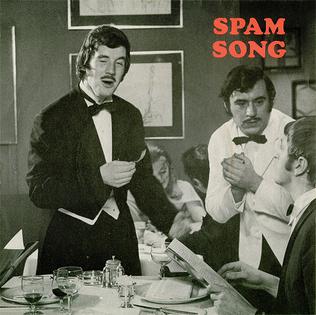
"Spam" is a Monty Python sketch, first televised in 1970 and written by Terry Jones and Michael Palin. In the sketch, two customers are lowered by wires into a greasy spoon café and try to order a breakfast from a menu that includes Spam in almost every dish, much to the consternation of one of the customers. As the waitress recites the Spam-filled menu, a group of Viking patrons drown out all conversations with a song, repeating "Spam, Spam, Spam, Spam… Lovely Spam! Wonderful Spam!".

The "Dead Parrot Sketch", alternatively and originally known as the "Pet Shop Sketch" or "Parrot Sketch", is a sketch from Monty Python's Flying Circus about a non-existent species of parrot, called a "Norwegian Blue". A satire on poor customer service, it was written by John Cleese and Graham Chapman and initially performed in the show's first series, in the eighth episode.
"The Funniest Joke in the World" is a Monty Python comedy sketch revolving around a joke that is so funny that anyone who reads or hears it promptly dies from laughter. Ernest Scribbler, a British "manufacturer of jokes", writes the joke on a piece of paper only to die laughing. His mother also immediately dies laughing after reading it, as do the first constables on the scene. Eventually the joke is contained, weaponized, and deployed against Germany during World War II.

"The Lumberjack Song" is a comedy song by the comedy troupe Monty Python. The song was written and composed by Terry Jones, Michael Palin, and Fred Tomlinson.
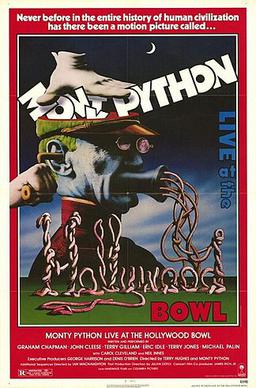
Monty Python Live at the Hollywood Bowl is a 1982 concert comedy film directed by Terry Hughes and starring the Monty Python comedy troupe as they perform many of their sketches at the Hollywood Bowl. The film also features Carol Cleveland in numerous supporting roles and Neil Innes performing songs. Also present for the shows and participating as an 'extra' was Python superfan Kim "Howard" Johnson.
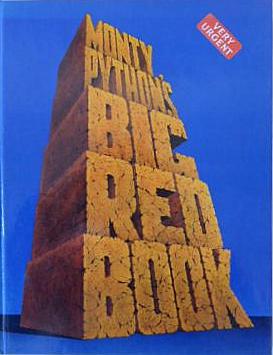
Monty Python's Big Red Book is a humour book comprising mostly material derived and reworked from the first two series of the Monty Python's Flying Circus BBC television series. Edited by Eric Idle, it was first published in the UK in 1971 by Methuen Publishing Ltd. It was later published in the United States in 1975 by Warner Books.

And Now for Something Completely Different is a 1971 British sketch comedy film based on the television comedy series Monty Python's Flying Circus featuring sketches from the show's first two series. The title was taken from a catchphrase used in the television show.
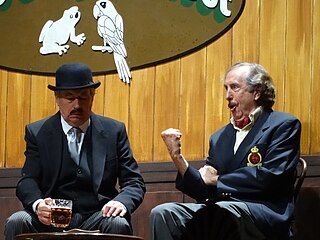
"Candid Photography", better known as "Nudge Nudge", is a sketch from the third Monty Python's Flying Circus episode, "How to Recognise Different Types of Trees From Quite a Long Way Away" featuring Eric Idle and Terry Jones as two strangers who meet in a pub.

"Argument Clinic" is a sketch from Monty Python's Flying Circus, written by John Cleese and Graham Chapman. The sketch was originally broadcast as part of the television series and has subsequently been performed live by the group. It relies heavily on wordplay and dialogue, and has been used as an example of how language works.

The "Four Yorkshiremen" is a comedy sketch that parodies nostalgic conversations about humble beginnings or difficult childhoods. It features four men from Yorkshire who reminisce about their upbringing. As the conversation progresses they try to outdo one another, and their accounts of deprived childhoods become increasingly absurd.

Monty Python's Personal Best is a miniseries of six one-hour specials, each showcasing the contributions of a particular Monty Python member. Produced by Python (Monty) Pictures Ltd., the series first aired on PBS stations between 22 February and 8 March 2006, although the Eric Idle and Michael Palin episodes were initially released by A&E on two Region 1 DVDs in 2005; the remaining episodes were released in late February 2006.
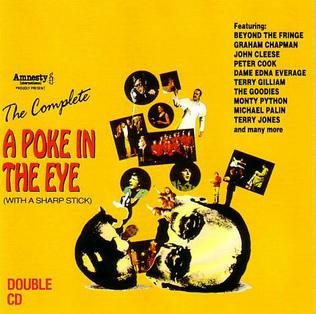
A Poke in the Eye (With a Sharp Stick) is the title of the first show in what later became the Secret Policeman's Ball series of benefit shows for human rights organization Amnesty International, although it pre-dated by three years the first show to bear that name. The film of the show was titled Pleasure at Her Majesty's which is sometimes mistakenly thought to be the title of the actual benefit show.
"Live from the Grill-O-Mat" is the fifth episode of Series 2 of Monty Python's Flying Circus. This show aired 27 October 1970 and was recorded 10 September 1970. The episode featured sketches including "Blackmail", "Society for Putting Things on Top of Other Things", "Accidents Sketch " and "The Butcher Who is Alternately Rude and Polite".
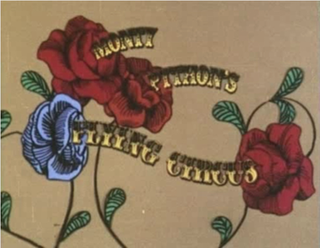
Monty Python's Flying Circus is a British surreal sketch comedy series created by and starring Graham Chapman, John Cleese, Eric Idle, Terry Jones, Michael Palin and Terry Gilliam, who became known collectively as "Monty Python", or the "Pythons". The first episode was recorded at the BBC on 7 September 1969 and premiered on 5 October on BBC1, with 45 episodes airing over four series from 1969 to 1974, plus two episodes for German TV. A feature film adaptation of several sketches, And Now for Something Completely Different, was released in 1971.
"Albatross" is a sketch from Monty Python's Flying Circus. It is particularly known for its opening lines: "Albatross! Albatross! Albatross!"

The Pythons Autobiography by The Pythons is the official autobiography of the Monty Python team, released in 2003. It covers the whole of Python history, from their childhoods all the way through to the 30th anniversary celebrations in 1999.
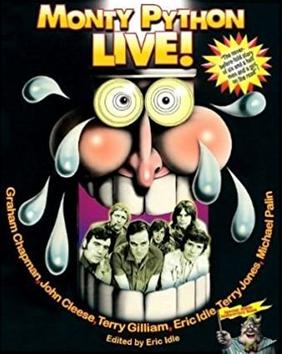
Monty Python Live! is a book detailing the various live performances of the Monty Python team between 1971 and 1980.















